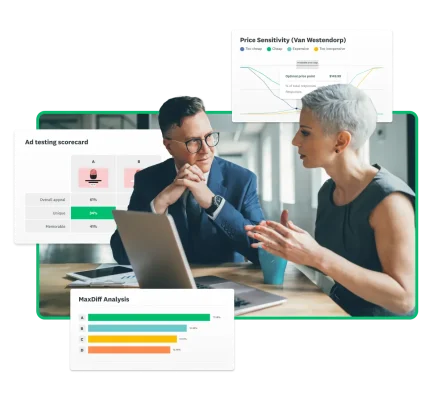Agile market research guide: How to improve your marketing strategy
The agile market research methodology allows for faster, more streamlined data collection and analysis. Learn how to apply agile to your market research strategy.

Agile has become one of the most popular market research methodologies across various industries, thanks to its numerous benefits. But what exactly is agile, and how can it benefit your business?
Agile market research methodology streamlines the process, delivering insights faster. Unlike traditional methods that can take weeks to gather feedback on a new product or ad concept, agile market research provides timely results, offering a more efficient and responsive approach.
What is agile market research methodology?
Agile market research is a flexible, iterative approach to gathering consumer insights quickly.
Rooted in the Agile Methodology, agile market research simplifies the traditional market research process into manageable phases. An agile approach enables quick adjustments and continuous feedback to respond swiftly to market changes.
For example, a company concept testing a product feature can use agile market research methodologies to gather customer feedback. Market research professionals can use the feedback to inform iterative improvements as well as retest the product.
Agile vs. traditional market research methods
Traditional market research methods tend to be linear and structured with a set sequence of steps. In contrast, agile market research uses an iterative process with continuous feedback to adapt to real-time market changes.
A traditional research structure may look something like:
- Identify an issue
- Design a hypothesis and plan a study
- Collect data and feedback with surveys, interviews, focus groups, etc.
- Analyze the data
- Use insights to make informed decisions
Traditional market research aligns with many team's research goals and resources. However, other teams may need a more flexible approach than agile market research.
Agile's short, collaborative research cycles allow teams to iterate on insights from each cycle, enabling quick adaptation to new data.
Benefits of agile market research
Agile market research is widely used by marketing teams to gain comprehensive insights into consumer behavior. How do you know if the agile market research method is suitable for your project or industry? Let’s review some top benefits to help you evaluate if agile will be effective for your needs.
1. Increased flexibility
A key benefit of agile market research is its flexibility. Unlike rigid traditional methods, agile allows teams the freedom to innovate throughout the process—especially valuable in fast-changing industries like technology.
Imagine a tech startup launching a new app. By using agile market research, they can test features with small groups and gather immediate feedback. This allows them to refine the app before its launch, ensuring it aligns with customer needs.
2. Continuous improvement
Agile market research is designed for continuous improvement. It allows teams to consistently test and refine product prototypes, ad concepts, and more to align with consumer expectations. This approach ensures that decisions are based on the most current data and insights.
For example, a retail company might test messaging for a new campaign through multiple rounds of agile research. After gathering feedback in each round, the company adjusts its messaging to better resonate with consumers before retesting. This process leads to a more targeted and effective marketing campaign.
3. Cost-effective
This market research methodology is cost-effective, focusing on smaller tasks that require fewer resources than traditional methods. By breaking down research into smaller parts, companies can avoid significant upfront expenses. This approach allows them to make adjustments before committing to costly research campaigns, resulting in overall savings.
For example, a company might conduct regional product tests with smaller groups. This approach helps identify which demographics resonate with their product, rather than running an expensive national survey. This agile approach saves money and allows the company to concentrate on areas with demonstrated interest in their product.
4. Improved collaboration
Improved collaboration is another key benefit of agile. As marketing, product development, and customer service teams collaborate to analyze research findings, they can more effectively make adjustments. Regular cross-team communication is essential to ensure alignment on project goals and to act on insights.
For example, a financial services company conducting agile research for a new product holds regular workshops with cross-functional teams. In these sessions, marketing, sales, and product teams collaborate to analyze insights and refine the product.
5. Real-time decision-making
Lastly, agile market research enables teams to leverage real-time feedback for timely decision-making. With immediate consumer insights, teams can make quicker decisions and seize spontaneous opportunities in dynamic markets.
For instance, a cosmetics brand launching a new product can quickly gather consumer feedback on packaging and design. This insight allows the brand to pivot quickly, avoiding costly production losses and ensuring the product appeals to customers.
How to use agile market research to improve your marketing strategy
Agile market research isn’t a brand-new concept, but it has spread like wildfire.
With self-service research tools like SurveyMonkey, teams can conduct market research without centralized insights teams or full-service agencies. This ensures businesses always have the data needed for faster decision-making.
Below is SurveyMonkey’s agile market research framework. It visualizes a cyclical approach to exploring, testing, validating, and optimizing strategies while continuously tracking progress.
This framework shortens lengthy research timelines by breaking them into manageable project sprints. Its versatility demonstrates how agile market research can support nearly any challenge or project you face at work.
Explore
The first step is to explore market needs, a crucial stage in early product development or marketing planning.
Identify demographics interested in your brand by assessing market trends, analyzing customer data, and pinpointing pain points. This knowledge will help define the scope of your research and guide your marketing strategy.
Test
The next stage is testing, where you ask, “Which ideas does my market prefer?” This can apply to a new product, features, ad copy, or messaging.
Agile researchers rapidly test ideas through surveys, A/B testing, and focus groups, gathering consumer feedback in short sprints to identify which concepts resonate most with the target market.
Validate
For any new idea, it’s essential to validate its potential success. Use market research feedback to answer, “How successful will my idea be?”
Data from the testing stage will confirm if the product, feature, message, or strategy is likely to perform well.
Optimize
Now it’s time to iterate by asking, “What improvements will make my idea even better?” Using your market research findings, adapt your product or idea to better meet consumer needs. The agile methodology excels in this stage, enabling you to refine based on feedback.
Track
Finally, track how your offerings or marketing strategy perform in real time. Ask, “How is my idea performing?”. Use KPIs like conversion rates, sales data, or customer engagement to gauge the long-term impact of your research. A brand tracking survey is a valuable tool for measuring brand health and responding to current market sentiment.
The key takeaway is research can be an activity any team can manage. However, it's essential to have a direction and plan—ensuring frequent research is strategic and actionable rather than random.
Frequently asked questions about agile market research
- What is the difference between Agile and Lean?
- What is the difference between Agile and Scrum?
SurveyMonkey empowers market research teams
SurveyMonkey’s market research solutions are built for your success. Get quick insights to drive better business decisions with AI-powered agile market research tools. SurveyMonkey empowers you and your team to stay competitive by monitoring purchasing behaviors, usage, attitudes, and more.
Get started today by signing up for a SurveyMonkey account.
Ready to get started?
Discover more resources

Understand your target market to fuel explosive brand growth
Brand marketing managers can use this toolkit to understand your target audience, grow your brand, and prove ROI.

Authenticity wins: How standout brands thrive in an AI-driven world
Webinar on how to use feedback to create products and content that resonates with customers

C-suite secrets: Smart strategies for tough times
Hear from industry leaders on how they're facing current business challenges and driving impact

Inspired by you, powered by AI: A reimagined SurveyMonkey experience
Webinar about SurveyMonkey platform updates